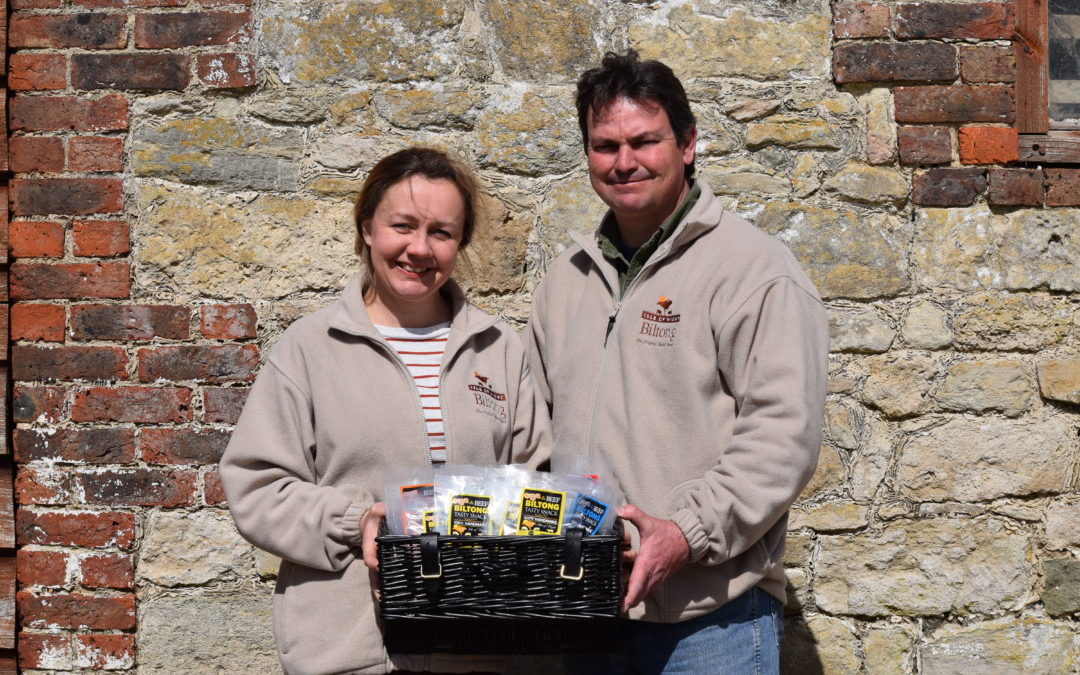How South African inspired dried meat has become an established Isle of Wight food brand – with some help from Mary Portas, Southampton university students and the Isle of Wight Lottery
Husband and wife team Nick and Sarah Greeff have brought a taste of Africa to the Island – and now they’re selling it abroad. Based at Newnham Farm in Binstead the Greeff’s have been curing beef to produce biltong to a traditional recipe since 2011. Sarah grew up on the Island and worked in retail in London before moving to Zimbabwe to teach with Voluntary Service Overseas. She met Nick, and together they ran safari camps and game ranches in Zimbabwe and Zambia. In late 2010 they decided to relocate to the Isle of Wight and start a new life as food producers, using Nick’s family recipe for biltong.
“It was always a dream to run our own business and be our own boss,” Sarah says. “Naivety is a wonderful thing! It makes you brave and we always seemed to be on a very steep learning curve. Neither of us had any experience of running a food business and there was an enormous amount to do.”
The fledgling company grew quickly, with premises established and converted in the early months of 2011. A few months later the Greeff’s were in business with the first Isle of Wight Biltong being sold from their stall at the Robin Hill Spring Garden Show.
“Our investment plan for 2011 was to attend every show on the Isle of Wight,” Sarah explains. “We did, taking our biltong to events almost every weekend for the season. We also approached all of the farm shops and they all supported us. We had a very busy summer – and then business died! We went into panic mode because we didn’t have the next stage of the business plan in place. We didn’t realise just how terrifying it could be.”
That winter Sarah and Nick reviewed their business model. They attended food producer trade shows which opened their eyes to how the food trade really works. The experience toughened them up but it also provided some key mainland contacts.
“We were in shock really. We learnt very quickly how food producers work with global brands and how suppliers really deal with supermarkets. We learnt a lot in those three days at Pro-Retail both from the makers alongside us and also from the ‘big boys’ of the food industry in the main hall!”
A contact from the show put the Greeff’s in contact with the Student Union shop at Southampton University. The man who ran the shop had a South African family and he placed an order. Almost five years later he’s still stocking the product.
“They consistently ordered and we owe them a great debt of gratitude. Knowing that somebody wanted the product gave us faith in it and the confidence to keep pushing. If they hadn’t kept ordering we might have given up.”
Support and inspiration also came from a meeting with retail specialist Mary Portas, which in turn led Sarah and Nick to approach the Isle of Wight Lottery. The Greeff’s showed their product to Mary at a trade show. Mary liked what she saw but told them they could do better. She held Nick’s face in her hand and described him as “the face of biltong”. Sarah and Nick left the show enthused and rebranded the business as Greeff’s Biltong instead of Isle of Wight Biltong. They also realised that they had to invest in order to grow the business. It was the first step on a new journey.
“We knew that we needed to produce a product with a shelf-life that could be stocked elsewhere and sold ‘off-the-shelf’ without us standing there to sell it. We’d been self-funded up until this point and we decided to take the scary decision to borrow money to buy a new packaging machine. It would allow us to compete and make ourselves very efficient – both in how we sold and how we produced the biltong.”
In early 2013 the Greeff’s came to the Isle of Wight Lottery with their business plan. They came away with a match-funded interest free loan of £15,000. They were able to buy their packing machine, although not without a few nervous moments.
“It was terrifying,” Sarah admits. “It was a huge leap of faith on the back of what we knew was an excellent product. It was a huge investment for a small artisan company. We feel enormously grateful to the people who helped us to find the funding, half from our bank and the other half from the Isle of Wight Lottery. Throughout we have been supported by a mentor from the Chamber of Commerce who has been a great sounding board for us. When it’s just the two of you running the business, having another person’s opinion and even just a ‘Well done’ makes all the difference.
“Without that machine we wouldn’t have been able to produce a product that we could sell remotely. We would have been limited to selling at fairs and festivals and that wasn’t financially viable for biltong on the Isle of Wight or in the south. The machine has made our business highly efficient. It’s so fast! It doesn’t take us hours to cut and pack any more. It’s reduced our man hours and we can maximise the amount of product that the two of us can make. Everything is still done by hand, but the packaging has allowed us to send our biltong far and wide. Our sales are up by 60% year on year. It feels amazing to have now paid off the loan. It’s definitely a milestone for us.”
With biltong wholesale buyers in Slovakia, Berlin and the Netherlands there’s plenty of potential for Sarah and Nick. They’ve appeared in Jamie Oliver’s magazine and on a daytime TV show presented by James Martin, a three minute feature which translated into £15,000 of product sales. In 2016 their biggest seller is still the Oupa’s Original, as learnt by 5 year old Nick at his grandfather’s knee.
“We have changed and grown so much in the past three years but it still feels like a rollercoaster,” Sarah says. “We want to continue as a small artisan producer with a quality product. We’d still like more customers though, who love our product as much as we do and who can sell it for us, wherever they are in the world. We always want to do better and we’re always trying to make the product better. That’s how we are as people.”
“It’s so strange to look back now,” Nick says. “Just a few years ago we were running safari lodges in the middle of nowhere, five hours from the nearest village, amongst elephants, hippos and lions. Now we’re an established food producer and my grandfather’s recipe is being enjoyed by people all over the world. We’ve come a long way.”
First published in the May 2016 issue of Island Business Magazine.



